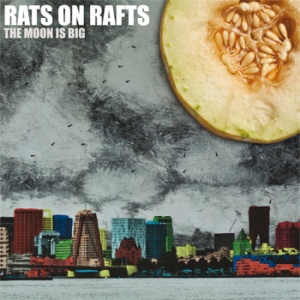Ah, The Moon is Big. These nine songs of grandeur and crackpot simplicity – by turns insidiously familiar yet frustratingly remote – are weighed down by their spiritual forefathers.
Ah, The Moon is Big. These nine songs of grandeur and crackpot simplicity – by turns insidiously familiar yet frustratingly remote – are weighed down by their spiritual forefathers.

http://www.ratsonrafts.com http://www.subroutine.nl
In moments of self-doubt and cynicism, as the tide of information licks at the harbour walls, I am reminded of the words of the great Nick Cave in some forgotten Sunday supplement: ‘When I was a kid there was no real information about music… you got a record with a cover – and that’s pretty much all the information you had, and these people were heroes… And the internet and everything else has taken a certain amount of that away.’ It is in this isolationist spirit that I approach the debut LP by Rotterdam’s Rats On Rafts, a band of utter unknowns in Britain but who stand poised to capture hearts and minds across northern Europe this winter.
Ah, The Moon is Big. These nine songs of grandeur and crackpot simplicity – by turns insidiously familiar yet frustratingly remote – are weighed down by their spiritual forefathers. They transport our memories back to Syd Barrett treading the boards at Ally Pally; back to Julian Cope treading through Rice Crispies at Rockfield Studios; back to Joe Meek treading dejectedly around Islington nick.
Opener Number 22 sets out their stall immediately, all creaking doors and thudding boots. It leads matter-of-factly to the title track, a tourniquet-tight rhythm with great slabs of guitar coming off the back of the chorus. Just as soon as the Copeyesque bass deadens behind an unrelenting three-note guitar line, the band come crashing back in to provide a thrilling finale. Singer David Fagan’s Ardwick-like vowels only add to the sense of disorientation.
It would be fair to say the record sags slightly in the middle, the cloying saxophone of Patient and the muddied vocals of Plastic Plaster belying an obviously skillful rhythm section. And yet, like the famous Middlesbrough side of the ’96/’97 season, the joy comes only in the final third; if Lalalala is the stodgy yet dependable Steve Vickers, God Is Dead and Jazz are Juninho and Ravanelli (Sleeping in Rotterdam, with its lilting guitar and crashing of waves is surely the Boro’s own Private Godfrey, Bryan Robson). God’s washes of warm reverb and one-fingered keyboard recall the scholastic It-era Pulp, with an oddly life-affirming children’s choir singing the refrain. Jazz is a nine minute soup of taught guitar, driving bass, and detuned cessation. Smashing in the gates of heaven and all that, and fading away to a sort of nothingness.
